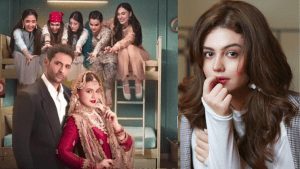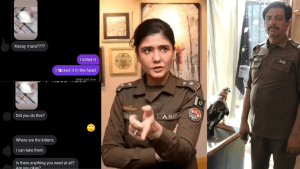It turns out nothing creates a more interesting plot in a Pakistani drama series than two women thrown in a never-ending feud with one another. As Tanaa Banaa debuted on Hum Tv this Ramzan, fans have sent in their praises for the shows feminist themes like the supportive husband Zain (played by Danyal Zafar) who support’s his wife Zoya’s (played by Alizeh Shah) ambition to complete her Masters after her marriage and to not learn household chores immediately.
However, the bigger issue we must address here is how the show is now centering around the growing feud between Zoya and her mother-in-law Fauzia (played by Juvaria Abbassi). Since the first episode we learn that when Zayn’s marriage was arranged to Zoya by the rest of the family members, Fauzia was the only one against it because she consistently complains about having no say in family decisions and wanted to choose her son’s bride by herself. From there onwards, there are several occasions where Fauzia tries to convince the rest of the family members to break off the marriage because she has several issues with the bride for example, her admittance that she doesn’t know how to cook or clean, or that she wishes to study further etc. In episode three, she comes into her son’s room at night and asks him “Tum meray say kitna pyar kartay ho?” to which the son replies “bohat ziada.” She then says “tou phir meri baat mano aur iss rishtay say inkaar karlo.”
After the marriage the audience can see that Fauzia’s resentment towards Zoya grows as she starts her MBA program and refuses to learn to cook and clean, and she also makes several other demands from Zain which infuriate Fauzia. For instance in episode 12, Fauzia complains angrily to the rest of the family about seeing Zain had not slept the previous night because Zoya keeps the light on since she needs to study: “Nend bhari hui thi uski ankhoon mein. Wo maharani jo hai na usko raaton ko parhna hai. Aur ye mera wo bacha hai jisko mein agar din mein bhi sulati thi tou puray ghar kay parday band kar kay sulati thi.”
Pakistani drama’s have for a long time relied on the woman versus woman trope to make an interesting plot for example in some of the most popular hits like Humsafar or Nand, there is a happy couple and then there’s the evil woman behind the scenes competing for the man’s affections and plotting for the woman’s take down. Tanaa Banaa has been receiving praises for being a feminist drama where men are seen cooking and even encouraging other men to be kinder and respectful to their wives, but was this trope necessary to include to spice up some interest in the drama?
The woman versus woman trope encourages audiences to sympathize with one female character who is the love interest of the man while villainizing the other woman who is selfishly wants the affections of the man. In this case we are aware of the fact that the villain, who is the mother in law, is excessively obsessed with her son, and doesn’t appreciate her lack of participation in the family affairs so instead are we able to sympathize with her instead of putting her down to uplift another woman? Ultimately, these type of tropes are misogynistic because they mold women into one-dimensional characters centered around the men in their life, and deny them any kind of agency or opinions of their own.
So guys, we should understand that its not necessary to put down another woman in order to uplift another one. The show could have had an amazing opportunity by demonstrating that a bride and her mother-in-law don’t need to feud in order to seek the approval of the men in their lives but it failed to do so.










